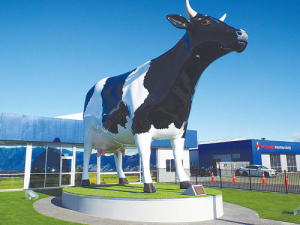The idea came from the late Laurie Maber who, with his wife Yvonne, ran the family farm machinery business Maber Motors and served as mayor of the dairy supply town. He wanted to put the town on the map, hence the giant cow.
Meanwhile, a herd of 15 ‘normal’ (model) cows showed up some two years ago, sponsored by local businesses; each had a theme and was decorated by different local artists.
At that time ‘Pop’ Maber said to son Geoff “let’s build a giant cow” and in doing so resurrected the original idea. Today the ‘herd’ numbers about 42, soon to grow when another 15 daisies hit the streets.
The giant, yet-to-be-named cow is 10m long x 7.3m high atop an 800mm plinth and weighs three tonnes; it sits outside Power Farming Group’s headquarters on Thames Street, and has come about because of a bequest Laurie Maber made before his death in 2016.
Power Farming Group had grown out of the seeds Maber sowed at the Maber Motors business that started in 1946, son Geoff growing the group into the largest privately owned tractor and farm machinery business in the southern hemisphere, with some 500 employees and turnover of about $400 million.
Laurie Maber was known for his no-nonsense presence, which got things done, and quickly, so once the family got over the loss of their patriarch the plan was accelerated to get the giant cow made.
Matcraft Industries, Hamilton, more familiar with building fibreglass boats, were up for the challenge that took about 12 months and 2000 man hours. It uses the latest composite materials and has a modular design that made it easy to move to its destination.
Unveiling the cow, Power Farming managing director Geoff Maber commented, “Pops always said that Morrinsville was the Cow Capital of New Zealand and today’s statistics prove he was right. Dairy contributes $16 million of the country’s exports; $5b of that comes from Waikato and $1b from within a 25km radius of Morrinsville.
“My father knew how important dairy was to our machinery business and was a dairy farmer in his own right, buying a large peatland farm out to the west of the town, where about 50 years ago he milked 1000 cows through one of the first rotary sheds in the country.
“We miss him dearly, but we’re sure he’s up there with a grin on his face today.”
















